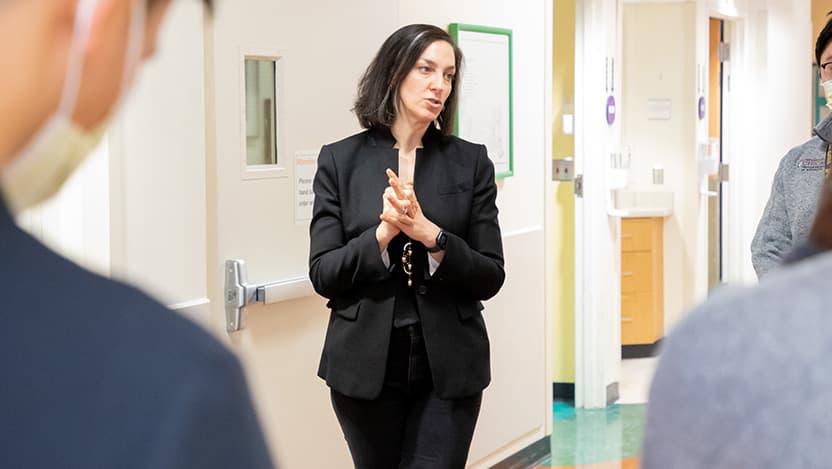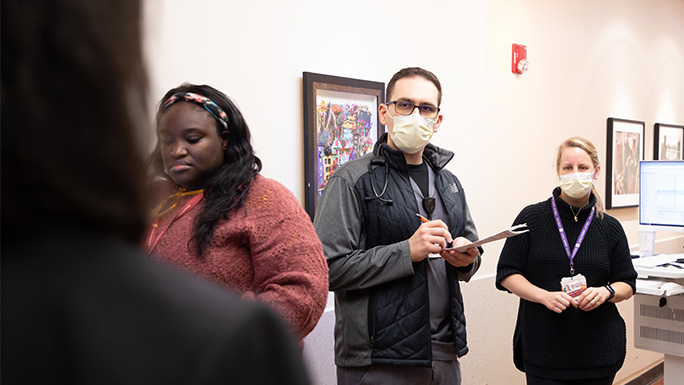Committed to physician education to enhance children’s health

In 2023, the Department of Pediatrics made an unprecedented number of changes to its residency program to individualize and support residents’ learning experience.
“Pediatric residents here have a personalized learning curriculum, multiple mentors specifically chosen to match residents’ research and clinical interests, individualized support, and ongoing feedback, allowing trainees to reach their highest potential,” said pediatric hospitalist Nicola Orlov, MD, MPH, Residency Program Director and Associate Chair for Education.
The residents and fellows are an essential part of multidisciplinary teams that treat Chicago’s most vulnerable kids. “With each patient encounter, residents learn how to overcome social determinants of health and support children in getting the best care possible,” said Orlov.
Mentors at the ready
Many pediatric residency programs face major barriers in establishing robust mentorship programs, according to recent published research conducted by Orlov and colleagues. In the first-ever survey of U.S. pediatric residency mentorship programs, directors reported that a lack of funding and an inability to protect faculty time hampered their mentorship efforts.
Despite this nationwide trend in mentorship, UChicago’s Department of Pediatrics’ training program recently doubled its leadership team by adding an additional five associate directors. These leaders have dedicated time to mentor their assigned residents in addition to their responsibility of ensuring continued innovation within the residency program.
Residents are paired with a second faculty mentor who serves as an advocate and supports them throughout their training in both their personal and professional lives.
“From our research, we have identified and implemented new approaches to mentorship to ensure that our residents achieve their goals over the course of their training,” said Orlov. “We believe a more individualized approach that encourages trainees to share their personal and professional goals allows for better mentorship overall.”

Individualized learning trajectories
To support residents on their learning path, faculty members recognize that trainees have unique backgrounds and career goals. “We are committed to fostering an inclusive environment, valuing the unique contributions of each trainee as we work together to address the health inequities of our patients,” said Orlov. “One aim of our program is to create psychological safety. Our residents know that we have their backs, that we are all learning, and that we are their advocates as they progress through residency.”
In the coming academic year, residents will complete a new, one-month mental health outpatient rotation.
“There is currently a huge burden of mental health illness among kids and adolescents, and it’s critical that pediatricians be able to manage disorders such as anxiety, depression and ADHD in their patients,” said Orlov.
Clinical hours have been redistributed so residents spend more time learning in outpatient clinics in anticipation of 2025 requirements by the Accreditation Council for Graduate Medical Education. “We have also analyzed previous residents’ board scores, their in-training exam scores, and the expectations of the American Board of Pediatrics to ensure that residents are well-prepared to take the boards and practice independently,” she said.
Regardless of where medical trainees are on their path to becoming leaders in pediatric care, our goal is to support their dreams and ambitions, foster their talents, and help them achieve their highest calling as pediatricians.
Residents are being trained as patient safety experts as part of a robust safety curriculum that will include all clinical staff. Residents are expected to report any concerns about the safety of patient care, which will trigger an investigation and lead to strategies to prevent potential patient harm.
Residents will also receive feedback from families, nurses, attendings and clinical staff to help them assess their progress in residency and growth toward their goals.
“Sometimes that feedback can be hard to hear, but it is important for residents to understand how they are perceived so they can improve their communication and professionalism skills with patients and better meet the needs of children and their families,” said Orlov.
Fellows as researchers
In 2023, 53 pediatric fellows participated in 13 subspecialty programs at Comer Children’s. The children’s hospital just added two more fellowships, Allergy and Immunology and Pediatric Hospital Medicine, for a total of 15 subspecialty fellowships.
“Our institution has a wide range of fellowship programs, which enables us to provide immediate, state-of-the-art specialty care to every Comer patient,” said neonatologist Bree Andrews, MD, MPH, who oversees the pediatric fellowship programs. “That’s a very dynamic way to practice medicine.”
Pediatric fellows at Comer are expected to devote 50% of their time to research to develop the expertise to treat clinically intricate problems in their subspecialty. Because the University of Chicago is renowned for the depth and breadth of its research, fellows receive unparalleled experience and exposure.
“At UChicago Medicine, we have extensive expertise in bench science, translational science, quality improvement and population health, which is what our fellows want in a research experience,” said Andrews.
The strong research component prepares physicians to conduct their own research after fellowship and to understand emerging research and the basic science behind treatments. “Our fellows develop the tools and expertise to really make an impact in their fields,” added Andrews.
At the other end of the medical-education continuum, Andrews teaches a premed course on the art of practicing medicine.
The Bucksbaum Institute launched the competitive, three-year Clinical Excellence Scholar Track (CEST) in 2013 to introduce undergraduates to the importance of the doctor-patient relationship, humanism and compassion in medical care.
Andrews is a CEST cohort leader as well as Senior Faculty Scholar at the Bucksbaum Institute. CEST requires that students provide 100 hours of volunteer service at UChicago Medicine and shadow physicians for at least 36 hours.
The early-career development program helps undergraduates decide what areas of medicine best suit their talents. “Through their volunteer work, research experiences, and clinical shadowing, the undergraduates develop rich experiences, making them amazing candidates for medical school and shaping their interests in specialties such as pediatrics,” she said.
Added Orlov: “Regardless of where medical trainees are on their path to becoming leaders in pediatric care, our goal is to support their dreams and ambitions, foster their talents, and help them achieve their highest calling as pediatricians.”
